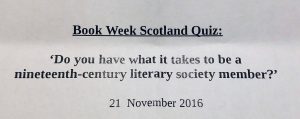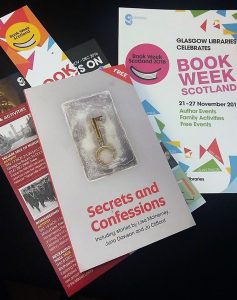Almost everyone on our publishing course has heard of the Edinburgh International Book Festival, which is due to take place in August. Not everyone, however, knows that Glasgow too has a very ambitious programme of literary celebrations. This year, Glasgow’s Book Festival ‘Aye, Write!’ is taking place between 15 and 25 March. From the impressive programme featuring over 200 authors, what caught my attention was the Tannahill Lecture that was to be delivered by Neil MacGregor, a Glasgow-born author of a forthcoming Penguin book entitled Living with the Gods. Having an academic background of cultural studies, I couldn’t resist the opportunity to listen to an art historian and philosopher give a talk about ‘how different societies have understood and articulated their place in the cosmic scheme’, as advertised in the festival programme.
On the night, I was amazed by the great turnout at the Glasgow Royal Concert Hall, where the lecture was taking place. One couldn’t help but notice, however, that the crowd was primarily one of pensioners. A very gallant elderly gentleman next to me dozed off for most of the talk (although, I must admit, it has happened to me on other occasions, despite the age difference). Nevertheless, I was happy to see that many people showing interest in a bookish and slightly academic event.
As soon as the talk started, I knew at once why so many people have turned up. Neil MacGregor is simply a brilliant speaker, genuinely enthusiastic about discovering as much as possible about human culture and sharing it with the general public. This sense of mission is perhaps not surprising for someone who has for many years run such important public institutions as the National Gallery and the British Museum.
In his lecture, MacGregor touched upon various themes related to the central question of how shared objects and narratives shape communities and help them establish a sense of a common identity. He skilfully presented a very brief, yet thoughtful, run through different emanations of such shared narratives, spanning the whole globe over thousands of years. MacGregor’s cultural references included, among others, the destruction of the Buddhas of Bamiyan, Putin’s orthodox Russia, the Swiss minaret referendum, beliefs of the ancient Romans and Persians, the eternal flame of the French Arc de Triomphe, the story of Our Lady of Guadalupe, and the Epic of Gilgamesh. Using those and many other examples, MacGregor demonstrated how shared religious beliefs have always been the foundation of communities and group solidarity. Common narratives provided people with a sense of cohesion and meaning in their lives.
The scholar ended his lecture on a surprising note. Unexpectedly, he moved on from discussing the images of floods in the Bible and the Epic of Gilgamesh to a cataclysm of our own times – the refugee crisis. MacGregor argued that our world has no global narrative, which would help us to respond better to the plight of refugees. His strong humanitarian message gave us all something to reflect upon long after the lecture.
MacGregor’s book, due in September 2018, explores all the above-mentioned themes in much greater detail. Listeners of BBC Radio 4 may already be familiar with the content, as the publication is based on a radio show of the same title, aired as an impressive 30-part series in 2017 (available as podcasts here).
The Tannahill Lecture marked the beginning of a great festival. The range of topics covered during the events is sure to satisfy all book lovers. From poetry, through Scottish interest, to art, politics, and sport, there is something for everyone. Avid readers can also turn themselves into aspiring writers, as there are nearly 20 different creative writing workshops running for the duration of the festival.
Browsing through the programme, I had only one regret – that I could not afford to attend more author meetings, as most are priced at ₤9, with no student concessions available. Other than that, ‘Aye, Write!’ is definitely doing a great job at developing the local literary scene. Can’t wait for next year!
Ewa Balcerzyk



